The Struggle Against Borders and for Autonomy in Kurdistan
by Ali Bektaş
[via RETORT where Iain Boal added this note: The text of this dispatch was received from Ali on 25.vii.14. It reflects the situation in Rojava during the third week of July. Apologies to AT for the delay in editing (23.viii.14). IB]
Temmuz, 2014
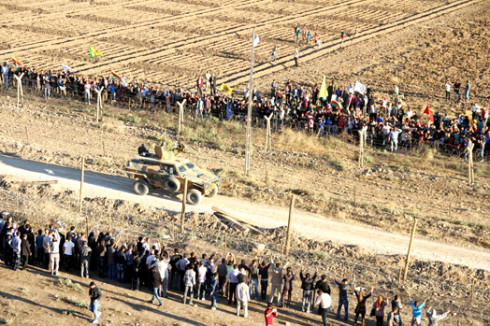 A Turkish armored personnel carrier patrolling the zone separating the Kurds between Turkey and Syria (credit: Özgür Gündem)
A Turkish armored personnel carrier patrolling the zone separating the Kurds between Turkey and Syria (credit: Özgür Gündem)
The struggle to abolish borders which separate peoples from each other is commonly represented by certain well-known and extreme examples. The militarized wall between the US and Mexico is one clear case in the consciousness of the Western left. Another disgusting manifestation is the stranglehold of Israel’s apartheid wall around the West Bank. Less well known, despite a hundred years of fierce struggle, are the borders that separate the 40 million Kurdish peoples from each other and which span Turkey, Syria, Iraq and Iran.
The Kurdish aspiration to destroy these borders is reaching its peak today on the boundary that separates Turkey and Syria. As a result of decades of resistance to these nation states the radical Kurds of Turkey and Syria are taking advantage of the geopolitical shakeup in the region and are declaring their regional autonomy. But before we examine the current situation, a brief sketch of the historical context is in order.
A History of Struggle
In the midst of the 1st World War, the semi-secret Sykes-Picot pact between Britain and France prefigured the borders which would define Syria, Lebanon, Palestine, Jordan and Iraq for a hundred years to come. After a four-year war under the leadership of Mustafa Kemal Atatürk – the ‘father’ of modern day Turkey – the Turkish Republic was established by the Lausanne Agreement in 1923. Turkey was not only the outcome of a war of independence but also of a national identity that was thoroughly artificial. This Turkish identity began to erase all other ethnicities and cultures within its territory which it regarded as a threat, and the Kurdish people and culture were at the top of this list. After being carved up and divided by the imperial powers of Europe, the Kurds now found themselves being erased by the burgeoning Turkish nationalism.
The 20th century history of the Kurds within the borders of the new Turkey was a bitter chronicle of rebellion and ensuing massacres. The revolt in Dersim province in 1937/38 is only one example; it left more than 10,000 Kurds dead and at least as many forceably removed from their homes.
Without doubt the most resilient Kurdish resistance movement emerged with the formation of the Kurdish Workers Party, or PKK, in 1978. Formed by Marxist-Leninist students, and led by Abdullah Öcalan, the PKK became a formidable enemy of the Turkish state as it waged a guerrilla war of independence, most aggressively in the late 80s and 90s. At that time, the goal of the PKK was to create a unified Kurdistan according to socialist principles. The PKK operated training camps across the border from Turkey in Iraq but more notably in Syria, especially in the Bekaa Valley near the border of Lebanon. As a testament to its trans-border aspirations, the PKK and its leader Öcalan made a deep impression on Kurds in Western Kurdistan, located in northern Syria. The 30-year civil war left more than 60,000 people dead within Turkish borders, the vast majority of them Kurds, members and sympathizers of the PKK, as well as 4,500 Kurdish villages evacuated and burnt by the Turkish military.
In 1999, Turkish special forces were able to capture Öcalan in Rome, where he was living in exile, by way of Kenya. The Kurdish struggle started to take a new form. From his extreme isolation in an island prison in the middle of the Sea of Marmara, Öcalan began to make references to the Zapatistas and even to the relatively obscure social ecologist Murray Bookchin. The war for independence became transformed into one for autonomy, self-governance and cultural expressions of Kurdish identity, such as the use of the Kurdish language, banned until very recently. More emphasis was placed upon the non-guerrilla organizations of the Kurdish people, that is, their legal political parties but also different modes of civil disobedience and the beginnings of an autonomous form of federative governance.
The Kurds in Turkey were not the only group under the yoke of a repressive nationalist Kemalism. Turkey’s secular ideology, one of the pillars of the Republic, was assiduously guarded by the Turkish Armed Forces and they targeted Islamists of various stripes vying for power. But the tables were turned at the beginning of the 21st century when the Justice and Development Party (AKP), with a program combining neoliberal development and Islam, swiftly rose to power. Then in Oslo in 2008, the AKP, led by the rabid yet shrewd Erdoğan, became the first Turkish government to open a dialogue with PKK leadership. Although window dressing for the most part, such overtures were unheard of until that moment.
In Kurdistan, The Sun Rises from the West
Recently, the situation for the Kurds has taken a different turn, since the days of the Arab Spring and its spread to Syria. The Syrian people were unable to force a swift departure of their despotic leader Bashar Al-Assad, as in the case in Tunisia, Egypt and Libya. Instead, the country plunged into a still raging war against the last remaining Ba’athist dictatorship in the region. From this desperate mess emerged ‘Rojava’ on the 19th of July, 2012.
Rojava, which means ‘West’ in the Kurdish language, was the product of what is referred to as a Democratic People’s Revolution by those who took advantage of the weakening of the Ba’athist regime, namely the PYD (the Democratic Unity Party). Their territory is comprised of three cantons in northern Syria – Cizîr to the east, Efrîn to the west and Kobanê in the middle. Instead of forming a state, they seek to implement democratic autonomy and self-governance with assemblies that extend down to the neighborhood level. In January of this year, their Democratic Autonomous Assembly passed a “social agreement” which guaranteed decentralization, free education in the native tongue, healthcare, housing and an end to child labor and any discrimination against women.
The radical Kurdish movement’s emphasis on women’s autonomy and empowerment must be underlined. There have been numerous PKK units and guerrilla camps which are only for women. Nearly all political organizations they form have two leaders, one a man and another a woman. Following in this tradition, on 2 April, 2012 in Rojava, an autonomous force, the Women’s Defense Forces (YPJ),was formed within the People’s Defense Forces (YPG). Both the YPG and YPJ have had to defend the revolution of Rojava nearly constantly from both the Ba’athist regime as well as the various stripes of Islamists who have turned Syria into the latest front of their jihad.
A Gang called ISIS
Al Qaeda in the Arabian peninsula, formed in 2009, grew gradually into a full-fledged Salafist organization, expanded its operations to Syria and renamed itself the Islamic State of Iraq and al-Sham (ISIS). Their form of jihad and a power struggle led to their disavowal by Al Qaeda earlier this year. They quickly became the main destination for Islamic extremists looking to join the holy war. ISIS stepped into the limelight of the Western media with its capture of Mosul in Iraq on June 10, 2014. But the autonomous regions of Rojava had by then been under a fierce ISIS assault for more than a year. On July 2nd, ISIS began a siege of Rojava’s central canton of Kobanê, using military equipment and munitions captured following their victory in Mosul. ISIS is trying to take Kobanê from the east, west and south and this ongoing siege constitutes the most serious threat that Rojava has come under thus far. The Kurdish movement in Turkey identifies deeply with Rojava since the PYD has been enormously influenced by the leadership of Öcalan. Therefore, a threat to the revolution in Rojava also constitutes a serious threat to the aspirations of regional autonomy for Kurds living within the borders of Turkey. In addition, many believe that the Turkish state is using ISIS in a proxy war against Kurdish autonomy by supplying them with arms and intelligence and free movement across its borders.
Following the ISIS siege of Kobanê, Kurdish and leftist political actors in Turkey, namely the HDP (Peoples’ Democratic Party) and BDP (Peace and Democracy Party), mobilized to intervene in the situation. Starting on 9th July, they set up four different encampments along the border in strategic locations to prevent regular ISIS movements in and out of Turkey, bringing their wounded to Turkish hospitals, and receiving logistical support from the Turkish state. These encampments have also been used as staging grounds for crossing the border en masse to join the YPG and YPJ forces in their defense of Kobanê. The current climate within the Kurdish movement in Turkey is one of a wartime mobilization with daily calls by party members for the youth to remove the borders and join the defense forces in Rojava.
One of the largest cexcursions in defiance of the border came on 14th July, when approximately 300 youth crossed into Kobanê and were greeted by YPG members on the other side to guide them across the minefield between the border and Kobanê. But this was only the prelude to what would be a historic celebration of the Kurdish struggle for regional autonomy, on the second anniversary of the revolution in Rojava.
Destroying the Border
All day and into the night on the 18th of July, thousands of Kurds flooded into the encampment in the township of Pirsus (Suruç in Turkish). Tents had been set up near the village of Alizer, a village literally divided by the border between Turkey and Syria. People came from all over Kurdistan to celebrate the revolution in Rojava and to remove the border so as to join their compatriots on the other side in their war against ISIS. The next day, on the 19th, the air was filled with dry dust as the camp was set up in the middle of a fallow field under gusts of scorching winds. The sun beat down at 45ºC yet people kept coming and joined in the ongoing halay (a circular dance popular amongst Kurds). With more people came more and more tanks and armored personal carriers belonging to the Turkish military as well as water cannons and other armored police vehicles. The tanks and troops of the Turkish military arrived from a nearby base which has the words “The border is our honor” emblazoned on its entrance. Yet the Kurdish villagers and militant youth were not intimidated by the show of force and remained determined to destroy this border between them and their comrades under siege. On the other side of the border, thousands of Kurds from Kobanê arrived to embrace those separated from them by flimsy barbed wire. As nighttime set in and the air became cooler, fireworks started to light the sky in a great celebration of the revolution. People were restless and the barbed wire lost any semblance of the deterrent it once represented. The stage was set for a spectacular confrontation.
And that confrontation came as expected. After the barbed wire was cut a few hundred Kurdish youth crossed into Kobanê to be greeted by a delegation from the YPG. The police and military brutally attacked the celebration, launching hundreds of teargas canisters into the area as well as assaulting the crowd with batons and water cannons. The perseverance of the people was inspiring, as everyone – from bold young tearaways to aged grandmothers – joined the resistance against the forces of the Turkish state with rocks, molotov cocktails and fireworks. From the stage came directives for people to come and join those fighting or at least to come with their cars to help evacuate the wounded. After a two-hour battle, the police and soldiers forced their way into the area with the tents and set fire to it all.
Five hours later, the military launched an operation against another encampment thirty kilometres away, near the village of Ziyaret, at the township of Birecik. The front lines of the siege of the Kobanê canton are visible from this point and this camp was strategically placed to sabotage ISIS movements and provide support and solidarity to the YPG. The people at that camp fought the military off and regained control of the camp only to have to endure another more vicious attack the following morning, on 21st July, during which the soldiers and police burned the tents and destroyed the cars of those there, arresting eight people after beating them.
Rojava for the Middle East
In the Western media when one hears of Kurds or Kurdistan it is most often in reference to Mesud Barzani and the Kurdish territory under his control in northern Iraq, which has also extended its sovereignty in the current context created by ISIS. It must be pointed out that this political formation has only minimal affinity with the radical revolutionary one launched by the PYD in Rojava. In fact both the PYD and PKK often find themselves in open conflict with Barzani’s vision for the Kurds. Occasionally doing the bidding of colonial states, Barzani is also a frequent visitor of Erdoğan. Recently he flew to Ankara to meet with him and discuss the situation unfolding in the region.
The siege around Kobanê by ISIS is continuing but the YPG and YPJ are determined to thwart it. They see the defense of Kobanê as the crucial battle to keep the battle for Kurdish autonomy alive. Many compare this current mobilization to that which took place in defense of the Spanish Revolution against the fascists in the 1930s. The crushing of the Spanish Revolution had global repercussions that are still being felt today. Similarly, the perseverance of the revolution in Rojava is the only hope for a different kind of Middle East, where peoples come together in solidarity with each other rather than at war under sectarianism stoked by colonial powers.
“Bijî Berxwedana Rojava”. Long Live the Rojava Resistance.
The author can be reached at: ali@riseup.net
—————————–
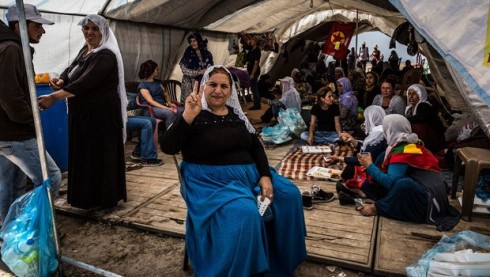 Woman making victory sign at the camp in Suruç (credit: Hürriyet)
Woman making victory sign at the camp in Suruç (credit: Hürriyet)
 Hundreds crossing the border to join the forces of the YPG on July 19th (credit: Mücadele Birliği)
Hundreds crossing the border to join the forces of the YPG on July 19th (credit: Mücadele Birliği)
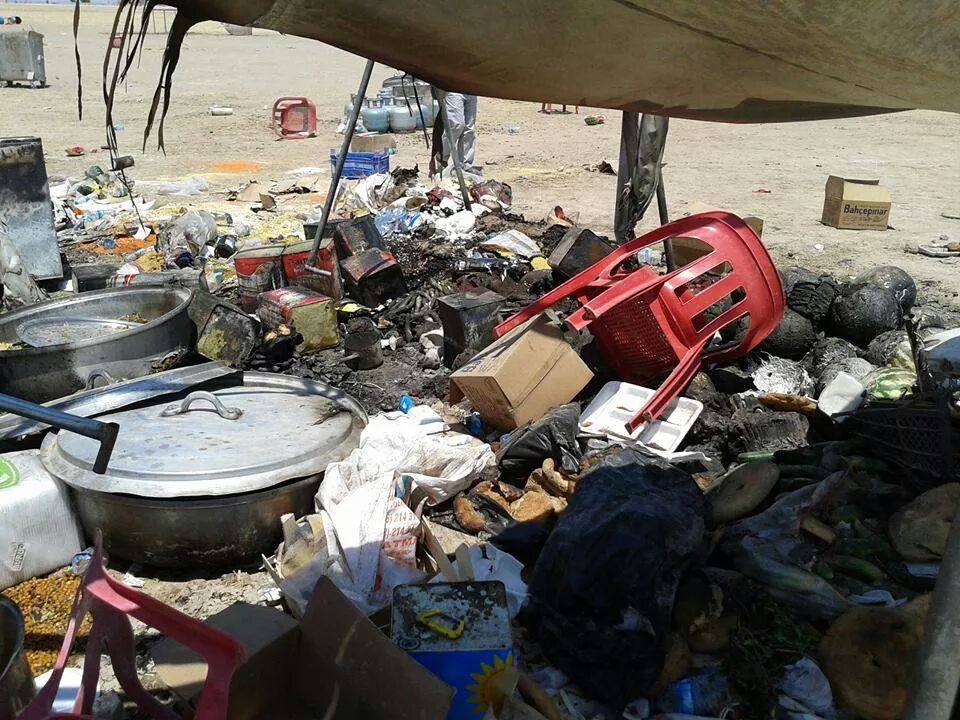 The encampment destroyed by the military and police (credit: BDP)
The encampment destroyed by the military and police (credit: BDP)
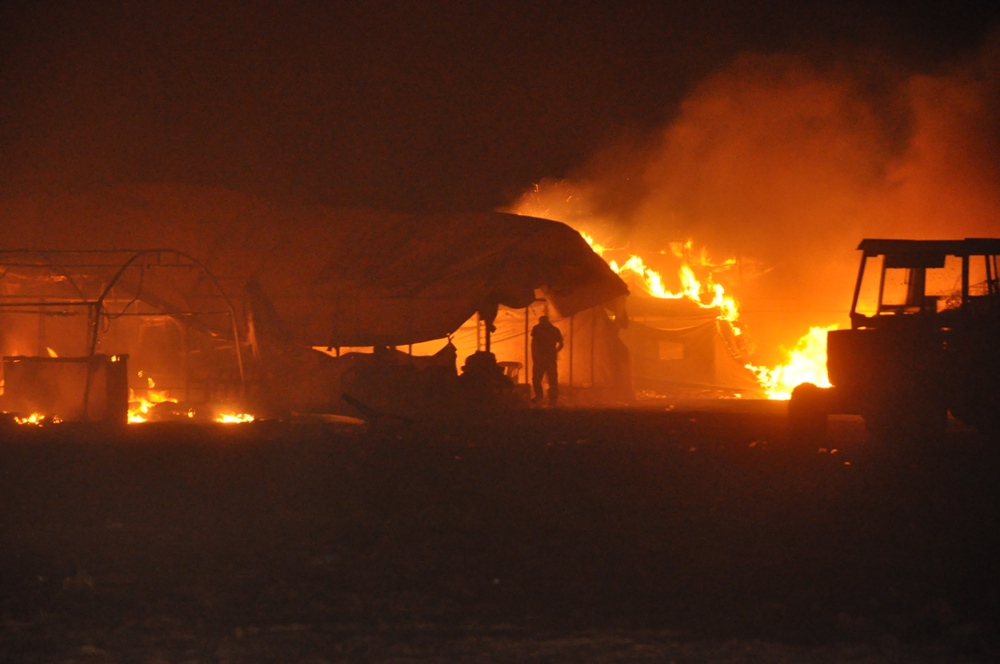 Rhe camp burning (credit: şanlı Urfa Güncel)
Rhe camp burning (credit: şanlı Urfa Güncel)
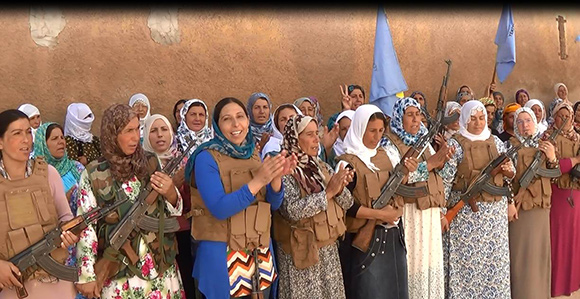 A Kobanê village where a group of mothers have armed themselves against ISIS (credit: Özgür Gündem)
A Kobanê village where a group of mothers have armed themselves against ISIS (credit: Özgür Gündem)

 “Interglacial Narrows (Poems 1915-2021)” Contra Mundum Press
“Interglacial Narrows (Poems 1915-2021)” Contra Mundum Press “Always the Many, Never the One: Conversations In-between, with Florent Toniello” Contra Mundum Press
“Always the Many, Never the One: Conversations In-between, with Florent Toniello” Contra Mundum Press “Conversations in the Pyrenees”
“Conversations in the Pyrenees” “A Voice Full of Cities: The Collected Essays of Robert Kelly.” Edited by Pierre Joris & Peter Cockelbergh
“A Voice Full of Cities: The Collected Essays of Robert Kelly.” Edited by Pierre Joris & Peter Cockelbergh “An American Suite” (Poems) —Inpatient Press
“An American Suite” (Poems) —Inpatient Press “Arabia (not so) Deserta” : Essays on Maghrebi & Mashreqi Writing & Culture
“Arabia (not so) Deserta” : Essays on Maghrebi & Mashreqi Writing & Culture “Barzakh” (Poems 2000-2012)
“Barzakh” (Poems 2000-2012) “Fox-trails, -tales & -trots”
“Fox-trails, -tales & -trots” “The Agony of I.B.” — A play. Editions PHI & TNL 2016
“The Agony of I.B.” — A play. Editions PHI & TNL 2016 “The Book of U / Le livre des cormorans”
“The Book of U / Le livre des cormorans” “Memory Rose Into Threshold Speech: The Collected Earlier Poetry of Paul Celan”
“Memory Rose Into Threshold Speech: The Collected Earlier Poetry of Paul Celan” “Paul Celan, Microliths They Are, Little Stones”
“Paul Celan, Microliths They Are, Little Stones” “Paul Celan: Breathturn into Timestead-The Collected Later Poetry.” Translated & with commentary by Pierre Joris. Farrar, Straus & Giroux
“Paul Celan: Breathturn into Timestead-The Collected Later Poetry.” Translated & with commentary by Pierre Joris. Farrar, Straus & Giroux
Ali Bektas writes a nice, informative piece minus the obligatory leftist swipes at Israel and the nonsense about the U.S./Mexican border. Perhaps he is unaware that here in the evil, North American west we protect our borders from the unwanted and those who prefer not to apply for permission to enter. Citizenship here is regarded as a privilege not a right. One just does not amble into a foreign country and say, “I am here, anoint me” Happily, not in the frozen north in any case. I first visited the United States at age 16. I had to show identification then. I showed my passport this past March. No biggie.
The Kurds are a separate case but only one of many that can be traced to the “agreements” after WWI. Most of today’s atrocities find their genesis there. 40 million Kurdish peoples find themselves in Turkey, Syria, Iraq and Iran. What a lovely group to sit down and negotiate with! Hence the “decades of resistance” and the seizing of “advantage” due to the regional unrest we see today.
The private Sykes-Picot pact/deal between Britain and France created Syria, Lebanon, Palestine, Jordan and Iraq, another lovely group. After the establishment of the Turkish Republic, Lausanne Agreement in 1923), Turkey began to eliminate Kurds and other minorities. Earlier, however, under the then Ottoman Empire, 1.5 million Armenians were slaughtered in the Genocide of 1915. On 24 April 24th, 1915 Ottoman authorities began by arresting some 250 Armenian intellectuals and community leaders in Constantinople. The genocide, which began during WWI but carried on later, featured wholesale killing, forced labor, deportation and death marches to the Syrian Desert where they were deprived of food and water and subjected to periodic robbery, rape and massacre by their military “escorts.” Though none were treated quite like the Armenians, indigenous and Christian ethnic groups such as the Assyrians, the Greeks and other minorities were similarly targeted for extermination. So the Kurds, while high up on the list, did not exactly “top” it.
As the successor state of the Ottoman Empire, Turkey to this day denies that the word ‘genocide’ accurately describes the mass killings of Armenians. 23 countries have officially recognized the mass killings as genocide, a view shared by most genocide scholars and historians. My guess is Turkey figures they’ve been good to the Kurds too!
There is little doubt that the Kurds have suffered greatly as Mr. Bektas has catalogued. They are not alone there. Christians and moderate Muslims have not fared too well either. Those in the “evil west” would do well to consider that the alleged “Arab Spring” brought little to no democracy to the entire region which had, historically, not been a beacon of freedom and light. I believe the period would be better named, ‘Winter for Christians, Jews and Assorted Minorities’. I believe I said so at the time.
Of all the “Springs,” today Tunisia represents the sole hope for democracy in the still highly volatile region but it is early days. Libya’s weak government has no constitution and is constantly threatened by armed militias who carry on as they please in a country awash with a wide variety of weapons.
Egypt’s Islamist president, Mohamed Morsy, was deposed by the army and the Muslim Brotherhood have once again been outlawed and labelled as a terrorist group, which in their treatment of Coptic Christians, they most certainly are.
Truly free elections in all the above mentioned countries would no doubt create new borders and countries but, looking at the line-up involved, it is unlikely to come quietly anywhere soon. In Iran, the Kurds must gain agreement from the laughable moderate, President Hassan Rouhani who reports to the Supreme Leader, Ali Khamenei who is, among other things, “supreme.” The fear of ISIS is however, great in Iran so the timing is good as long as the Kurds continue to fight and die. It is anyone’s guess how Iran will deal later. In Iraq, who knows who to talk to, ISIS or America? In Lebanon, I guess Hezbollah’s in charge. Bashar al-Assad is still sort of in charge in Syria. Good luck negotiating with that lot. The Kurds face war or devastation wherever they look.
Beyond ISIS, the “rabid yet shrewd” Erdoğan might be their biggest problem. I know, I know, he’s one of ours. A fellow member of NATO, a member of the European Union, Erdoğan is supposed to be one of the good guys. For my money, he is not.
Amid all the regional chaos, Erdoğan is the closest thing Islam has to a respectable elder statesman. Of course, he can’t talk about Israel without raving hysteria and Nazi comparisons.
“Just like Hitler, who sought to establish a race free of all faults, Israel is chasing after the same target,” Mr. Erdogan told supporters at a campaign event. “They kill women so that they will not give birth to Palestinians; they kill babies so that they won’t grow up; they kill men so they can’t defend their country. They will drown in the blood they shed.” On another occasion, Mr. Erdogan argued that Israel has been engaged in a Nazi-like campaign of “systematic genocide every day and every month” since its creation in 1948. Indeed, Mr. Erdogan believes that the Israelis are worse than Hitler having declared: “They curse Hitler day and night, but they have surpassed Hitler in barbarism.”
And he’s on our side?
Mr. Erdogan’s Islamist supporters apparently cheer heartily when he makes these lunatic comparisons at public events. The total casualties inflicted by Israel during its recent campaign to suppress Hamas rocket fire and tunnel infiltration barely amount to a rounding error compared to the untold thousands of innocent civilians who have lost their lives during Turkey’s own campaign against PKK terrorists. The Kurds know this well.
Mr. Erdogan is a cynical, two-faced, political bottom feeder who says anything, including despicable language about Israel in order to shore up his support among voters in advance of Turkey’s presidential election. That was this past March and June. He won. What does this tell you about Turkey’s “base?” Kurds, please take note.
But Mr. Erdogan, as Prime Minister of a large nation lying at the hinge point between Europe and Asia, should know better; he should do better. His logistics network nourishes jihadis in Syria and encourages rogue “humanitarian” missions to Hamas. Even many Muslim nations in the region effectively have taken sides with Israel in its battle with Hamas. To Turkey’s disgrace, Mr. Erdogan is a notable outlier
Turkey (along with Qatar) is now essentially a full political partner of Hamas. Turkey is home to Hamas leader Saleh al-Arouri, founder of the West Bank branch of the Qassam Brigades, Hamas’ military wing. Erdogan’s AKP government donates significantly to Hamas. Many also believe that Turkey uses ISIS in a proxy war against Kurdish autonomy by supplying them with arms and intelligence and free movement across its borders.
While none of the Kurds border mates can be described as angels, none are as devious as Erdogan. The fact that he has taken to uttering blood libels in support of Hamas’ campaign against Israel tells us much about his hateful ideology and should provide great insights to the Kurds.
I hope the Kurds keep, maintain and grow their democratic autonomy and self-government. They would make a good neighbor. Pity their neighbors don’t see them that way. They may have friends in some Turkish political parties but the government party is not one of them. As long as Erdogan is in power, the Kurds should be careful, very careful indeed.
Let’s hope the Rojava Resistance won’t last another century.